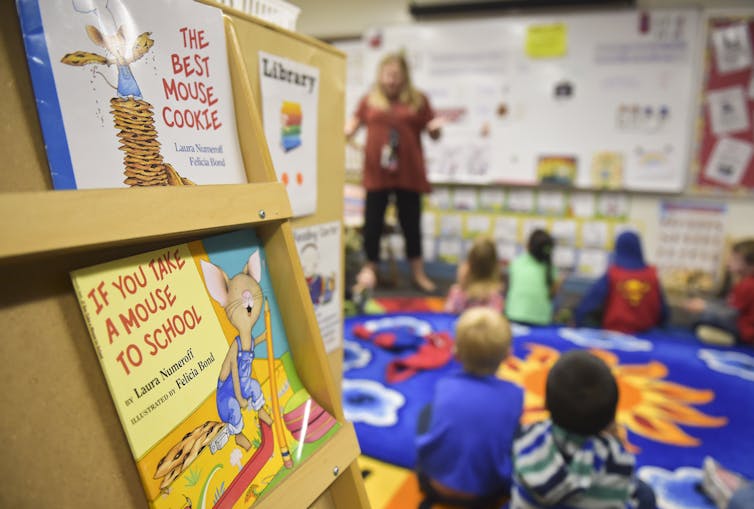Education
One in Four Early Childhood Educators in Colorado Report Mistreatment

A recent study reveals that approximately 25% of early childhood educators in Colorado have experienced mistreatment from co-workers. This research, conducted among 332 staff members across 42 Head Start centers in the Denver metropolitan area and southeast Colorado, highlights significant issues related to workplace culture and mental health in early childhood education.
Early childhood educators play a critical role in nurturing and teaching children under the age of five, with their work influencing long-term developmental outcomes. However, adverse workplace experiences can hinder their ability to foster healthy relationships with the children they serve. One educator emphasized the gravity of their responsibilities, stating, “We have little people that depend on us, parents depend on us, and we need to make sure that we are there for the kids when they need us.”
The study, led by academic professionals in public health, found that 15% of early childhood staff reported experiencing multiple forms of mistreatment, including bullying, harassment, and condescending behavior. This mistreatment correlates with increased reports of poor mental health, with educators indicating an average of seven poor mental health days in the month prior to the survey.
Impact of Discrimination and Workplace Stress
The findings revealed concerning trends regarding discrimination within the workforce. About 10% of early child care staff reported discrimination based on race or ethnicity, with younger staff aged 18-29 three times more likely to report such experiences compared to older colleagues. Discrimination can diminish trust among coworkers and impact overall job engagement.
The psychological toll of workplace mistreatment is compounded by the physical demands of the job. Early childhood educators frequently face challenges such as lifting and managing children with varying capabilities, which adds to their stress levels. The study noted that younger workers, particularly those under 35, reported between eight to nine poor mental health days, while older educators reported an average of 5.6 days.
Strategies for Improvement
Addressing the well-being of early childhood staff requires a multifaceted approach at both societal and organizational levels. The research underscores the need for better compensation; in 2023, the average salary for U.S. preschool teachers was $37,120, compared to $63,680 for elementary school teachers. Low pay contributes to high turnover rates, which are four times greater among early childhood educators than their elementary counterparts.
Educators have voiced concerns regarding their value in the profession. “Turnover has a lot to do with pay, unfortunately, and we don’t get paid a whole lot of money,” said one educator. In response to these issues, organizations can implement health-centered policies and provide training to cultivate supportive workplace environments.
Programs like the WELL Program, designed and successfully implemented across five Colorado-based Head Start networks, aim to improve staff well-being through initiatives that promote mindfulness and better sleep. Participants have reported that such programs help them manage stress effectively, ensuring it does not negatively affect their interactions with children.
The study’s findings call for continued investigation into workplace dynamics and generational differences in communication to foster a healthier environment for early childhood educators. By prioritizing the well-being of these essential workers, society can enhance not only their job satisfaction but also the quality of care provided to young children.
The research was conducted by a team including Charlotte Farewell and Jini Puma, who received funding from the Administration for Children and Families. The study emphasizes the urgent need for reforms that acknowledge and support the vital role of early childhood educators in shaping the future workforce.
-

 Science1 month ago
Science1 month agoNostradamus’ 2026 Predictions: Star Death and Dark Events Loom
-

 Technology2 months ago
Technology2 months agoOpenAI to Implement Age Verification for ChatGPT by December 2025
-

 Technology7 months ago
Technology7 months agoDiscover the Top 10 Calorie Counting Apps of 2025
-

 Health5 months ago
Health5 months agoBella Hadid Shares Health Update After Treatment for Lyme Disease
-

 Health5 months ago
Health5 months agoAnalysts Project Stronger Growth for Apple’s iPhone 17 Lineup
-

 Technology5 months ago
Technology5 months agoElectric Moto Influencer Surronster Arrested in Tijuana
-

 Education5 months ago
Education5 months agoHarvard Secures Court Victory Over Federal Funding Cuts
-

 Health5 months ago
Health5 months agoErin Bates Shares Recovery Update Following Sepsis Complications
-

 Technology7 months ago
Technology7 months agoMeta Initiates $60B AI Data Center Expansion, Starting in Ohio
-

 Technology6 months ago
Technology6 months agoDiscover How to Reverse Image Search Using ChatGPT Effortlessly
-

 Science4 months ago
Science4 months agoStarship V3 Set for 2026 Launch After Successful Final Test of Version 2
-

 Technology7 months ago
Technology7 months agoRecovering a Suspended TikTok Account: A Step-by-Step Guide




















